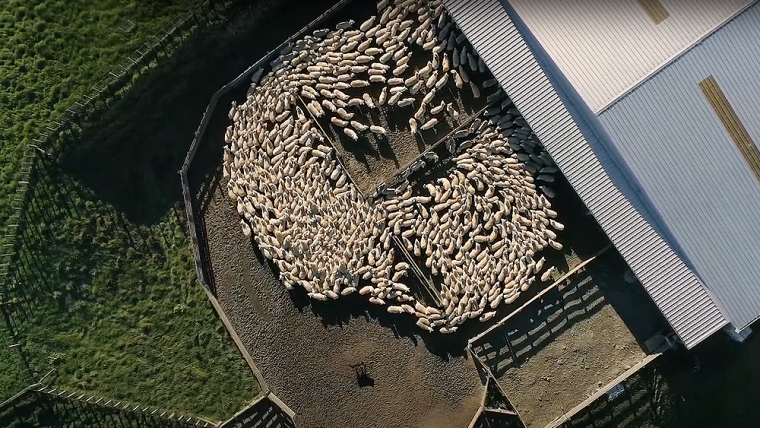
It’s not as if it has been easy, confronting the multiple operational and logistical challenges posed by Covid, but the emergence in New Zealand of Omicron threatens to make the last two years look like a walk in the park.
Offshore experience shows a 30-40% level of workforce absenteeism because of sickness, while in Australia workers at Teys Naracoorte abattoir who tested positive, although asymptomatic, were allowed by South Australia Health to come to work unless they were feeling unwell. This was a specific exemption to cope with a supply chain crisis, although it appears Woolworths Australia may not have got the message, as they suspended their contract with the abattoir for a week. Teys requires a PCR or rapid antigen test of all workers with further tests being performed daily.
Unfortunately there have been reports of a meat shortage in the supermarket chillers in Melbourne which may well have been caused by the suspension. The beef kill for that week was less than 50,000 head which is very low for the Australian red meat processing sector and explains why Australian retailers are looking for New Zealand product.
Although meat processors have started planning for absenteeism, they already have restrictions in place as a result of the systems developed for previous Covid variants and lockdowns which includes plant employees working in defined pods. Silver Fern Farms’ CEO Simon Limmer confirms the company has moved its operating framework to the red traffic light setting which is essentially business as usual “as we have always taken a precautionary approach to our operations irrespective of the alert level. Our priority is the safety and welfare of our staff, but as a market-led organisation we also have a big focus on delivering to our customers through the constraints in which we will be operating.”
Limmer also drew attention to the use of RATs which SFF trialled with around 30 businesses last year, stating these would be another helpful tool because they were faster, despite a lower degree of accuracy than the PCR nasal swab test.
The main problem with RATs is not the level of accuracy, but the government’s snail like process for authorising their use and ordering them in the first place. There are currently 4.6 million in the country with their availability restricted to key workers. Global supplies are very hard to get hold of which means we are yet again at the back of the queue, when, with a modicum of forethought, we could have had tens of millions in the country already. One meat company had a shipment of RATs intercepted at the border last year because the bureaucratically petrified Ministry of Health didn’t yet believe in their value and wouldn’t let them into the country. For goodness’ sake, give me strength!
Peter Conley, ANZCO’s CEO, told me they are working with Business New Zealand to get access to RATs, but buying them is proving difficult, as they are only available through pharmacies, whereas in Europe and the USA they are readily available from a wide range of retail outlets. Meanwhile ANZCO is prioritising three legs of its anti-Covid strategy: promotion of vaccinations and booster shots throughout its workforce, maintaining full PPE clothing and equipment, and close cooperation with the relevant health authority in each region regarding isolation and testing.
Conley believes this wave will be quite different from Alpha and Delta because of the variant’s transmissibility and potential to move like wildfire through all parts of the supply chain: on farm, livestock transport and handling, processing plant operations, distribution, port handling and shipping. Those stages are just in this country with huge potential for disruption at the other end.
As the largest destination for our exports, not limited to the meat industry, China presents a particular risk because of the regular lockdowns of whole cities and the relative ineffectiveness of its vaccine against all coronavirus variants, especially Omicron.
For these reasons farmers must plan early and have a fallback position to reduce their risk.
Conley’s advice is not to play the field, but to get stock away early rather than late, while realising contracted suppliers will get preference. Limmer reinforces this, stating SFF’s focus will be on moving animals off farm, “although at times this may come at the expense of value.” Similar to ANZCO, SFF’s priority will be “our fully shared and valued suppliers”, as well as cases where there is animal welfare risk. Talk to your livestock buyer early is the main theme.
Omicron will exacerbate the worker shortage problem which already affects the industry. SSF already has a shortage of around 550 workers which cannot be filled locally because of New Zealand’s low unemployment rate. Representations to the government to reconsider employer access to overseas workers have so far fallen on deaf ears, mirroring the crisis in the health sector which has a critical shortage of specialists, doctors and nurses. In my part of the world a strawberry grower has ripped whole paddocks of strawberries out because his Pacific Island workforce was sent back home, the Immigration Department refusing to extend their visas. And all we ever hear from the Minister of Immigration, Kris Fa’afoi, is a deafening silence.
My conversations with the meat companies demonstrate a careful approach with a lot of planning informed by past experience, but nervousness about the unknown and how Omicron will affect the seasonal peak over the next three months.
Current schedule and saleyard prices are available in the right-hand menu of the Rural section of this website.

We welcome your comments below. If you are not already registered, please register to comment
Remember we welcome robust, respectful and insightful debate. We don't welcome abusive or defamatory comments and will de-register those repeatedly making such comments. Our current comment policy is here.